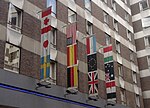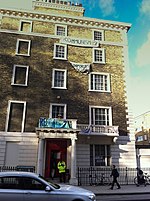UCL Institute of Education
The UCL Institute of Education (IOE) is the faculty of education and society of University College London (UCL). It specialises in postgraduate study and research in the field of education and is one of UCL's 11 constituent faculties. Prior to merging with UCL in 2014, it was a constituent college of the University of London. The IOE is ranked first in the world for education in the QS World University Rankings, and has been so every year since 2014.The IOE is the largest education research body in the United Kingdom, with over 700 research students in the doctoral school. It also has the largest portfolio of postgraduate programmes in education in the UK, with approximately 4,000 students taking Master's programmes, and a further 1,200 students on PGCE teacher-training courses. At any one time the IOE hosts over 100 research projects funded by Research Councils, government departments and other agencies.
Excerpt from the Wikipedia article UCL Institute of Education (License: CC BY-SA 3.0, Authors).UCL Institute of Education
Howland Street, London Fitzrovia (London Borough of Camden)
Geographical coordinates (GPS) Address Nearby Places Show on map
Geographical coordinates (GPS)
| Latitude | Longitude |
|---|---|
| N 51.52301 ° | E -0.12802 ° |
Address
University College London
Howland Street
W1T 4TN London, Fitzrovia (London Borough of Camden)
England, United Kingdom
Open on Google Maps







